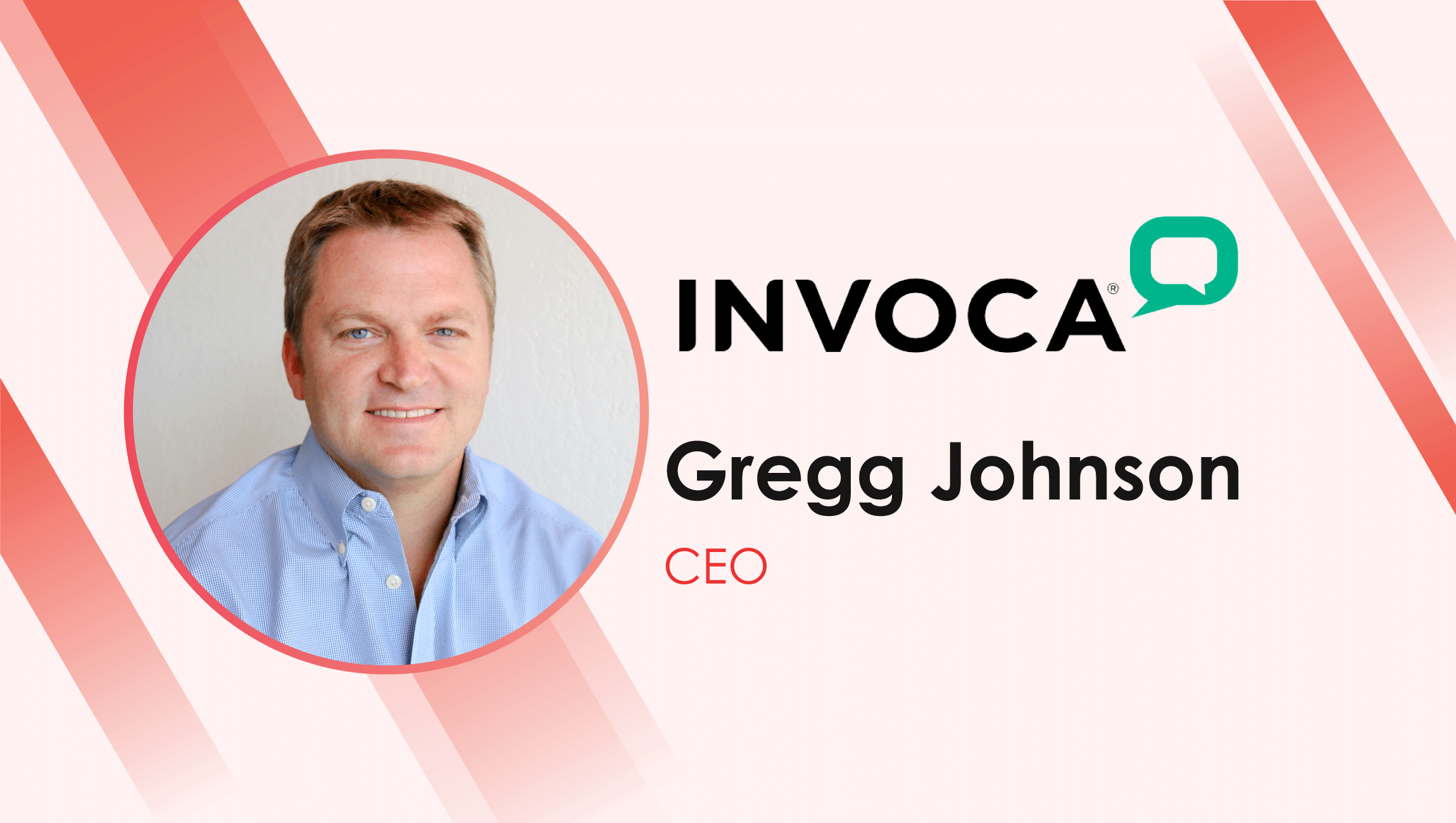Gregg Johnson, CEO at Invoca talks about the power of conversational AI and the impact of tech on modern contact centers in this exclusive Q&A session:
_________
Welcome to this MarTech Series chat, Gregg, tell us about yourself and your journey through the years…
I’ve had the pleasure of working with many of the world’s best enterprise brands bringing products to market in emerging categories. Before joining Invoca, I worked at Salesforce in product roles – and spent a lot of time on helping companies understand the meaning and intent of human conversations in marketing, sales, and customer service use cases. Since Invoca sits at the intersection of digital marketing and the contact center – and given that the company was an early pioneer in using AI to understand human-to-human conversation – I was excited by the market opportunity and joined Invoca in 2016.
Education has also been an important part of my career journey. While studying at Stanford, I focused on the intersection of technology and innovation, then attended the Johns Hopkins School of Advanced International Studies to study the broader global landscape. Finally, I completed my MBA from the Wharton School of Business, developing a deep understanding of leadership, finance, and strategy and how they all work together.
This diverse background encourages me to think about several perspectives as I lead the talented team at Invoca today. These experiences keep our team pushing boundaries and driving growth as we help our customers surpass their most challenging goals.
We’d love to hear about Invoca’s recent innovations and growth initiatives?
As brands are investing more in AI and automation to power their marketing teams and contact centers, Invoca’s increased our R&D investment to accelerate our product development and bring even more AI-powered solutions to market faster.
As an example, we just introduced Agent Voice ID, which is part of our automated quality assurance solution for contact centers. It uses AI-driven voice biometric technology to detect the specific agent speaking on every call, so contact center managers can see in Invoca how each agent is performing against call handling KPIs, where they fall short, and how to coach them to improve.
We have also recently secured two new AI patents. The first is for our Signal AI solution, which makes it easy for marketers to create their own AI models. With these models, brands can measure data points such as if phone calls from digital marketing are qualified leads, the product or service the caller is interested in, if they converted on the call, and more. This qualitative call data is critical to measuring and optimizing marketing performance.
The second is for our Signal Discovery solution, which uses unsupervised machine learning to group contact center conversations by topic. Where Signal AI measures the data points you tell it to, Signal Discovery surfaces new insights you aren’t actively looking for, like new consumer trends you can use in your messaging or CX issues with your website or contact center that are costing you conversions.
Last summer, we raised $83 million Series F equity financing to drive AI innovation and deeper solutions for the automotive industry (we just welcomed Subaru of America to Invoca), while also broadening our market presence in the U.K. We also recently crossed $100 million in ARR, a milestone that speaks to our category leadership and growing customer base.
As we continue to push the boundaries of what’s possible in the world of AI conversation intelligence and contact center automation, we’re excited to bring our roadmap to life to surprise and delight our customers in ways they never imagined.
How are you and your team observing changes in conversational AI usage and adoption impact marketing and contact center workflows globally?
Within this tough economic climate, every dollar counts. Companies that aggressively invest in conversational AI are much better positioned to stand out and gain market share. By surfacing customer data and insights throughout the customer journey, from the moment of initial engagement to final conversion, agents can optimize for efficiency, conversions, and customer retention. For example, when one of our customers DIRECTV started using Invoca, they began to send their phone sales agents with a screenpop of the customer’s digital journey information to provide a tailored customer experience. By leveraging this pre-call data, DIRECTV agents were able to reduce call times by jumping right into what the specific customer is looking for and in turn, handle more calls. DIRECTV saw their sales team improve close rates by an impressive 110%.
Marketing Technology News: MarTech Interview with Lindsay Sanchez, CMO at Khoros
Can you talk about some of the key brands that have been able to build exceptional conversational AI experiences and what others can learn from them?
Invoca is committed to helping businesses achieve their goals through powerful, cutting-edge solutions. Our partnership with Five9 is a perfect example of this commitment in action. By combining Invoca’s AI-powered solutions with Five9’s IVA technology in what we call PreSense, we’re able to provide even more value to our customers.
By utilizing Five9’s IVA, brands can automate routine customer inquiries, such as checking order status, and optimize their contact center’s agent capacity for higher-value interactions. This approach prioritizes high-value agent time, ultimately driving more ROI for brands. Ultimately, our goal is to help businesses thrive in today’s fast-paced, ever-changing marketplace.
Invoca customers have found success in exceeding their goals in both the contact center and in marketing. For example, Invoca customer Kinetic by Windstream, is a privately held communications and software company that offers managed communications services, where phone calls are critical to their business, particularly in customer acquisition and retention. Kinetic by Windstream achieved 150% of its 2020 net subscriber goal after just 10 months with Invoca and realized 7x ROI for the Invoca solution in the first eight months of use. They also experienced a 40% increase in average revenue per sales call.
For first time or initial users of conversational AI tools, what precautionary steps would you share?
I’m a firm believer in the power of conversational AI tools to drive convenience, efficiency, and cost-effectiveness for brands. While automated solutions, such as chatbots and virtual assistants may have revolutionized customer interactions by providing businesses with valuable insights into their customers’ needs and preferences, despite the many benefits, brands must be mindful of the potential downsides of relying solely on these tools to power customer interactions.
One of the most significant risks is the possibility of customers feeling frustrated and dissatisfied if they are unable to escalate to a human conversation at the moment they need help most. This can negatively impact the customer experience and cause frustration, leading to lower satisfaction, decreased loyalty, and ultimately lost revenue.
Brands must strike the right balance between digital automation and human interaction to ensure customers always feel heard and valued. By combining the two with the right balance, they’ll be empowered to provide seamless, personalized and memorable customer experiences that drive actual business results.
Invoca provides customers with the best of both worlds: the convenience and efficiency of automated solutions combined with the personal touch of human interaction.
A few common misconceptions about AI you’d like to dispel?
I’d like to emphasize that the impact of generative AI is not a distant future concept, but rather a present-day reality that is rapidly growing. According to Gartner, by 2025, a staggering 30% of outbound marketing messages from large organizations will be synthetically generated, up from less than 2% just three years prior.
Furthermore, there is a common misconception that AI will replace human roles in the contact center. However, I don’t believe this is the case. Rather, conversational AI tools should be viewed as a supplement to enhance human-led service. By providing data and insights at every stage of the customer journey, these tools can enable the most efficient and personalized CX, which ultimately drives increased ROI.
Marketing Technology News: ADA Compliance: Top Tools that help Brands with their Website ADA Compliance

Invoca is a leader in AI-powered conversation intelligence that enables marketing, sales, customer experience, and eCommerce teams to understand and immediately act on the information consumers share via conversations. Through deep integrations with leading technology platforms, revenue teams can turn conversation data into automated action to enhance every digital touchpoint and human interaction, leading to better experiences, more conversions, and higher revenue. Invoca is trusted by top brands like Dish Network, Subaru of America, Mayo Clinic, Mutual of Omaha, and DIRECTV. Invoca has raised $184M from leading venture capitalists including Upfront Ventures, Accel, Silver Lake Waterman, H.I.G. Growth Partners, and Salesforce Ventures.
Gregg Johnson is CEO of Invoca, the cloud leader in AI-powered conversation intelligence for revenue teams that enables marketing, sales, customer experience, and eCommerce teams to understand and immediately act on the information consumers share via conversations. As a seasoned digital marketing and SaaS leader with over fifteen years of extensive experience bringing products to market in emerging categories, Gregg’s led large teams and worked with the world’s best enterprise brands.
Before joining Invoca, Gregg led Salesforce Marketing Cloud’s social marketing product line, integrating $1 billion of M&A investments into the Salesforce product portfolio. Prior to Salesforce, Gregg drove product strategy and development for Salesforce Chatter, helping define the nascent category of enterprise social networking and rolling out one of Salesforce’s most successful products. Earlier in his career, Gregg was a consultant at Boston Consulting Group and worked in sales, marketing and product roles at several startups.
He graduated from Stanford University and holds a Master’s degree from Johns Hopkins School of Advanced International Studies and an MBA from the Wharton School of Business.
BONUS READ – Jon Miller, CMO at Demandbase chats about the evolution of ABM in this webchat with MarTechSeries:
Missed The Latest Episode of The SalesStar Podcast? Have a quick listen here!
Episode 169: B2B Sales, Process Enhancements and Tips: with Sean Flynn, SVP of Global Sales at Avalara
Episode 168: AI and its Impact on Marketing and Sales with Marco Lagi, Vice President, Artificial Intelligence at Intentsify
Episode 167: Precision Based Marketing Tips – with Carter Lassy, Chief Product Officer at Terminus












